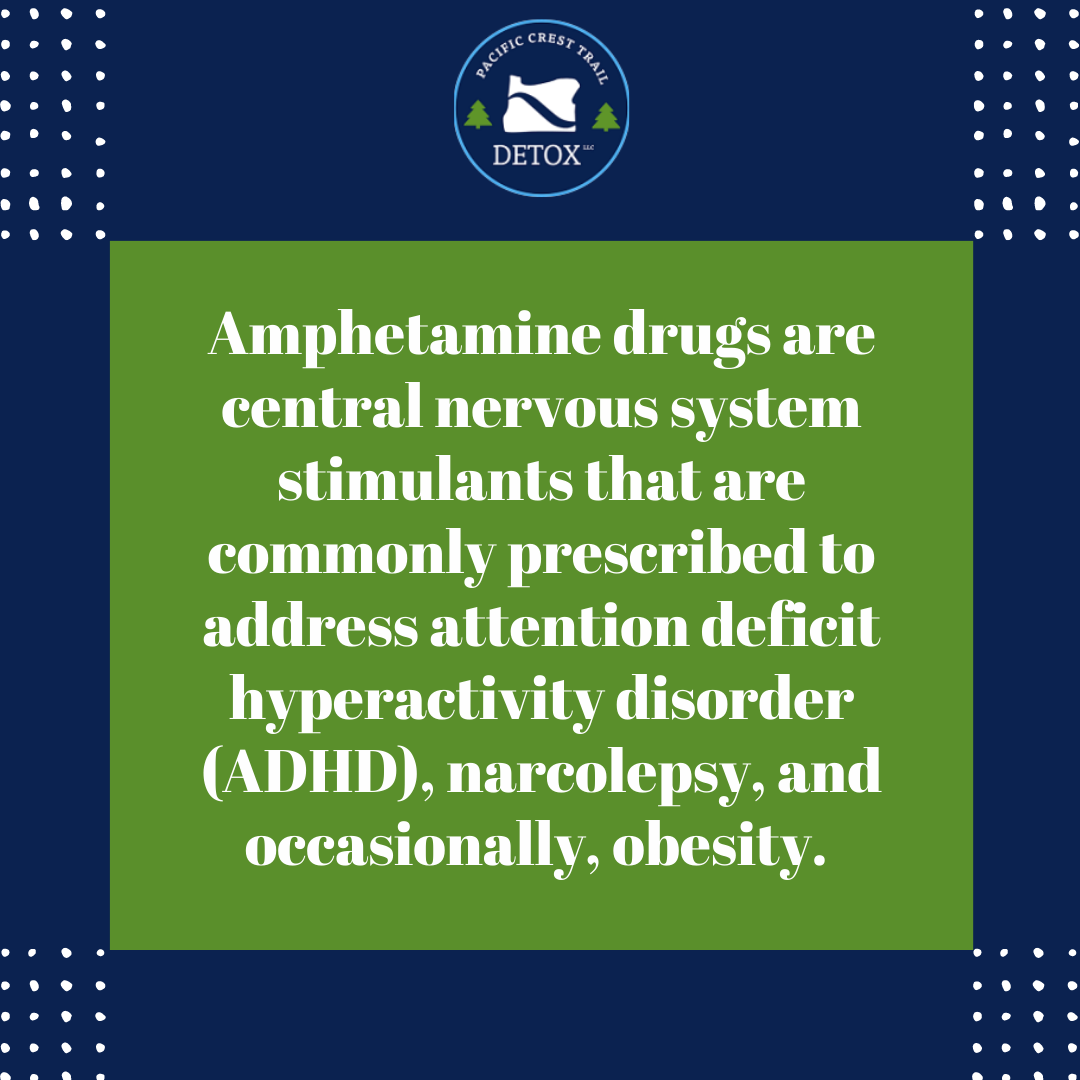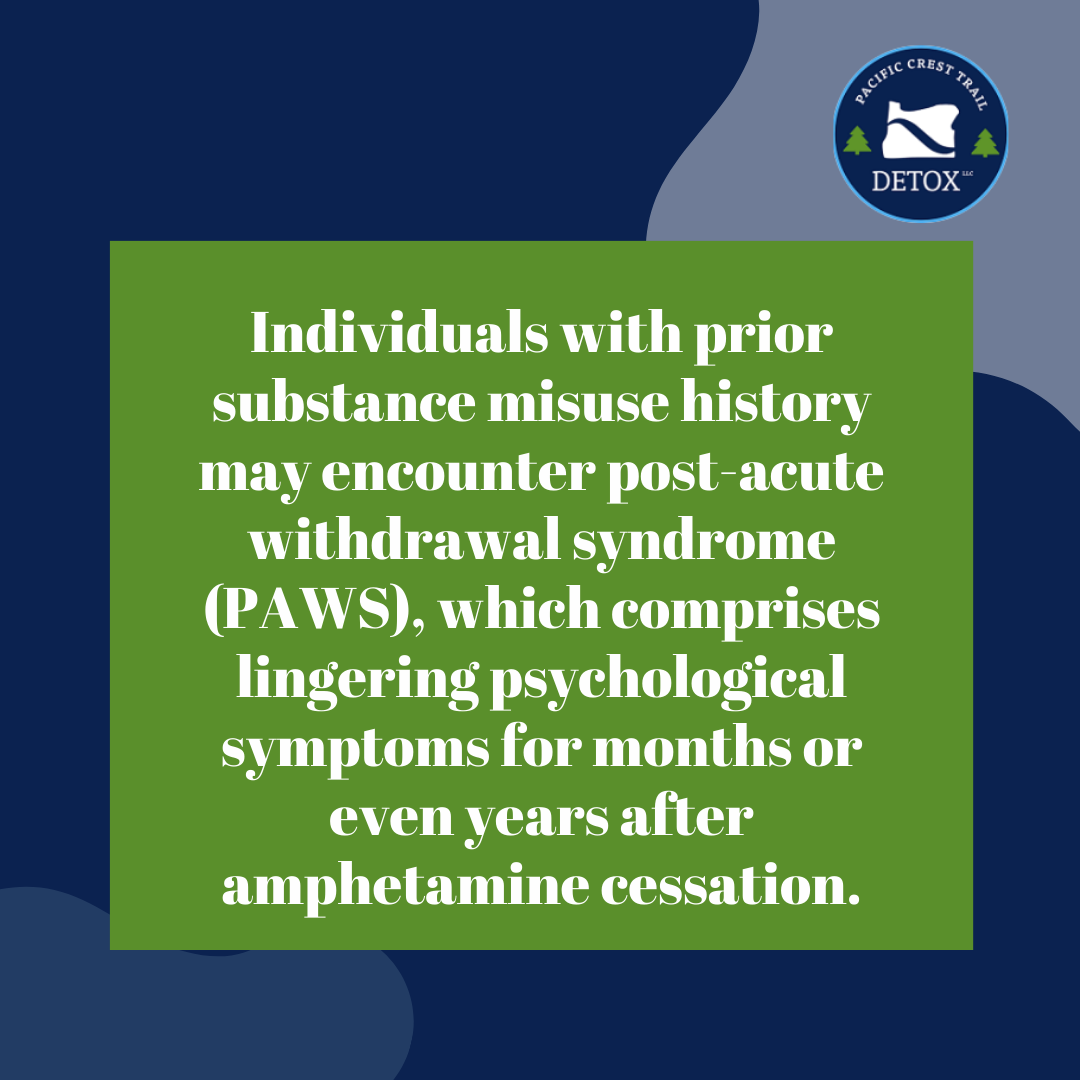Amphetamine withdrawal is a complex process that occurs when individuals who regularly consume amphetamines decide to discontinue or substantially decrease their intake.
Amphetamines are stimulant drugs, including Adderall, Ritalin, and methamphetamine. They can lead to addiction and dependence, and when the body no longer receives the drug, it reacts with various physical and psychological symptoms. The amphetamine effects on the body and mind can be debilitating, but you can overcome them with the right support and guidance.
This blog post will share practical tips and strategies to help individuals cope with the physical and psychological symptoms of drug withdrawal. By focusing on self-care, healthy lifestyle choices, and creating a solid support system, we hope to empower those going through this difficult time and set them on a successful recovery journey.
 Source: Pacific Crest Trail Detox
Source: Pacific Crest Trail DetoxWhat are Amphetamines?
Amphetamine drugs are central nervous system stimulants that are commonly prescribed to address attention deficit hyperactivity disorder (ADHD), narcolepsy, and occasionally, obesity. They increase the neurotransmitters in the brain, such as dopamine and norepinephrine, which increase alertness, concentration, and energy.
One common question we encounter is, “Is Adderall an amphetamine?” The answer is yes; Adderall combines two amphetamine salts, specifically amphetamine and dextroamphetamine. Other well-known amphetamines include Ritalin (methylphenidate) and methamphetamine, an illegal and highly addictive street drug.
Amphetamine drugs have the potential for abuse and addiction when used improperly or without a prescription. Undergoing detoxification is often the first step towards recovery for those struggling with amphetamine addiction.
What is detox? This process involves eliminating the drug from the body and allowing the brain and nervous system to adjust to functioning without the stimulant. It can be challenging as it often triggers uncomfortable and dangerous withdrawal symptoms.
It’s essential to approach detox with the guidance of medical professionals and a strong support system to ensure a safe and successful journey towards recovery.

Understanding the Symptoms of Amphetamine Withdrawal
When recovering from amphetamine addiction, one of the hurdles you’ll face is overcoming withdrawal. This brings a distinct set of physical and psychological symptoms you must tackle tenaciously.
A thorough understanding of these symptoms is crucial for successfully navigating the withdrawal process and preparing yourself and your support system.
Physical Symptoms:
- Fatigue and exhaustion
- Insomnia or hypersomnia (sleeping too much)
- Increased appetite
- Headaches
- Muscle aches and pains
- Slowed reflexes and movements
- Abdominal cramps and digestive issues
Psychological Symptoms:
- Anxiety and irritability
- Depression
- Intense cravings for amphetamines
- Paranoia
- Mood swings
- Difficulty concentrating
- Vivid, unpleasant dreams
- Suicidal thoughts (in severe cases)
The duration and intensity of these symptoms vary depending on the length of amphetamine use, the dosage, and individual physiology.
Withdrawal symptoms typically commence within a few hours to several days after the last use and can go on for several days to a few weeks.
Individuals with prior substance misuse history may encounter post-acute withdrawal syndrome (PAWS), which comprises lingering psychological symptoms for months or even years after amphetamine cessation.
It’s vital to remember that everyone’s experience with amphetamine withdrawal is unique. Knowing the potential symptoms can help you anticipate issues and develop coping strategies to navigate this difficult time.
 Source: Pacific Crest Trail Detox
Source: Pacific Crest Trail DetoxCoping Strategies for Amphetamine Withdrawal
When seeking treatment for amphetamine withdrawal, it’s important to have various coping strategies at your disposal. These tips can help make the withdrawal process more manageable and improve your chances of a successful recovery.
Sleep Hygiene
Establishing a regular sleep schedule and a relaxing bedtime routine can help enhance the quality of your sleep during withdrawal. Ensure your sleep environment is comfortable, dark, and quiet to promote restorative rest. Limit your screen time before bed and avoid caffeine in the evenings.
Exercise
Regular physical activity can help alleviate withdrawal symptoms, such as anxiety, depression, and fatigue. Exercise releases endorphins, improving mood and providing a natural energy boost. Start with gentle activities like walking or yoga and gradually increase intensity as you feel comfortable.
Healthy Lifestyle Choices
To aid the healing process, prioritize nutrition and hydration during withdrawal. Ensure your diet includes a balance of whole grains, lean proteins, fruits, and vegetables to provide your body with the essential nutrients. Keep yourself hydrated as it helps flush toxins from your system.
Support System
Spend time with friends, family, and support groups who understand your situation and can provide encouragement and guidance. Sharing your experiences with others who have similar struggles can help alleviate feelings of isolation and foster a sense of camaraderie.
Relaxation Techniques
Practice deep breathing exercises and mindfulness techniques to help manage stress and mood swings during withdrawal. Regularly engaging in activities like meditation or progressive muscle relaxation can help promote a sense of calm and emotional balance.
Seek Professional Help
If withdrawal symptoms become overwhelming or you’re struggling with cravings, don’t hesitate to contact a medical professional or addiction specialist like Pacific Crest Trail. We can provide additional resources, support, and guidance to help you through the withdrawal process.
Each journey to recovery is distinct. As such, you must identify the right treatment approach. Factors like addiction severity, mental health status, and an individual’s support network can influence the effectiveness of various coping strategies.
By tailoring treatment to address individual needs, the chances of achieving long-lasting sobriety can improve. Additionally, remaining dedicated to your recovery enables you to conquer amphetamine withdrawal and forge a path towards a healthier, substance-free life.
Do you know someone struggling with amphetamine addiction? Don’t hesitate to ask for help. Contact Pacific Crest Trail Detox at (844) 960-3639, and let us guide you through the process to achieve a successful recovery.

